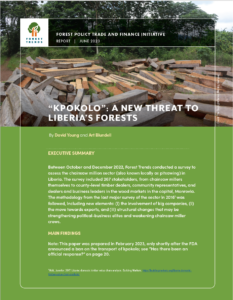“Kpokolo”: A New Threat to Liberia’s Forests
By David Young and Arthur Blundell View PublicationThis report reveals how Liberian companies are increasingly ignoring the law to convert and export logs in an altered form to the detriment of small-scale millers, national rule of law, and Liberia’s forest ecosystem. This report advocates for the Government of Liberia to implement Liberia’s Chainsaw Milling Regulation, as well as the wider reform process to bring Liberia’s forest sector under rule-of-law.
“Kpokolo,” or “blockwood,” describes squared timber produced by chainsaw milling. Although there is no legal definition for it, kpokolo can be distinguished from other forms of chainsaw-milled timber by its larger dimensions, tendency toward high-value species, the involvement of big business and foreigners, and the focus on exports (mainly through containers from Liberia’s ports or over land). This is in contravention of Liberia’s laws and regulations and is allowing larger companies to squeeze out artisanal operators who have traditionally supplied the domestic market.
In February 2023, recognizing kpokolo production and export was out of control, Liberia’s Forestry Development Authority (FDA) reportedly banned transportation of kpokolo. However, no official statement or document has been found, so its status remains unclear. With no formal public announcement, companies can easily deny knowing illegality and easily side-step any subsequent accusation that the ban has not been enforced.

